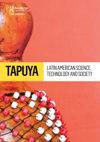哥伦比亚和厄瓜多尔的传统知识政策合作生产
IF 1.2
Q2 HISTORY & PHILOSOPHY OF SCIENCE
Tapuya: Latin American Science, Technology and Society
Pub Date : 2023-11-07
DOI:10.1080/25729861.2023.2188107
引用次数: 0
摘要
本文打开了哥伦比亚和厄瓜多尔政府提出的关于与遗传资源相关的传统知识的政策共同生产过程的黑箱,以符合土著人民的需要。本文的目的是分析厄瓜多尔和哥伦比亚两国作为组织者、多元表达保障者和公共审议促进者的角色有何异同,以及政策制定者如何为土著人民制定传统知识政策打开空间。本文转向定性研究,侧重于从公共行为者收集信息。所获得的数据评估了我们的工作假设,即国家在制定传统知识政策方面的作用在厄瓜多尔比在哥伦比亚更为民主。本文章由计算机程序翻译,如有差异,请以英文原文为准。
Traditional knowledge policy co-production in Colombia and Ecuador
This paper opens the black box of policy co-production processes presented by the Colombian and Ecuadorian governments, regarding the traditional knowledge associated with genetic resources, in keeping with the necessities of Indigenous peoples. The purpose of this paper is to analyze what similarities and differences there exist in the role of the Ecuadorian and Colombian States as organizers, guarantors of plural expression, and facilitators of public deliberation, and how policymakers have opened the space for Indigenous peoples for producing traditional knowledge policy. The paper turns to qualitative research focused on collecting information from public actors. The data obtained assesses our working hypothesis that the role of the State in the production of traditional knowledge policy has been more democratic in Ecuador than in Colombia.
求助全文
通过发布文献求助,成功后即可免费获取论文全文。
去求助
来源期刊

Tapuya: Latin American Science, Technology and Society
Social Sciences-Social Sciences (all)
CiteScore
1.60
自引率
0.00%
发文量
39
审稿时长
19 weeks
 求助内容:
求助内容: 应助结果提醒方式:
应助结果提醒方式:


